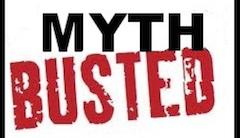
With everything going on with public education these days, I thought I'd take the time to "bust" some education myths.
Myth: Teachers get paid too much
Reality: we get paid fair or less than fair wages for the effort, training, professionalism, and work we do. But, we do it because we love it. We also spend a huge amount of our own money on supplies, resources, and conferences and education. In private industry, the company provides what you need to do your job. Not so in education. Teachers are a profession, with high standards for entry and education.
Myth: Teachers get paid over the summer
Reality: some teachers can elect to have their salary divided up into 26 paychecks a year as opposed to 21. We don't get paid anything extra. Most teachers work other jobs over the summer to make ends meet.
Myth: Teacher unions are bad
Reality: most teacher unions are a good thing. They fight for fair pay and working conditions for teachers, allowing a district to attract good teachers. They fight for class size and resources, making a better environment for students. Like anything, there are some unions that aren't great, but overall teacher unions protect teachers from political or personal attacks.
Myth: Tenure and unions protect bad teachers
Reality: tenure and unions just give teachers due process before firing. They push for assistance vs. adversary. I've seen tenured teachers who were union reps get let go because of their performance.
Myth: Education is too expensive, we have to cut funding
Reality: education is expensive, but it is worth it. It is an investment in the future, even if you don't have any kids. Everyone benefits from a strong educational system. There are places were education can be more efficient and money savvy, but cutting funding and teachers without proper plans lead to very bad outcomes. Many school districts do more than educate students - they provide them with meals, social work, counseling, medical care and after school programs.
Myth: Class size doesn't matter
Reality: class size is a major factor in student success. Smaller classes mean more time per student from the teacher and a more orderly environment.
Myth: We can't run education like a business
Reality: we can, but only in certain ways. Educational administration and planning is very inefficient and should adopt proven business strategies. However, we can not treat students as "product".
Myth: Teachers get great benefits for free, or low cost
Reality: Teachers get good benefits, that they pay for. I worked as an engineer for ten years before becoming an educator and I got much better benefits as an engineer in private industry than as a public school teacher. Teacher benefits have been cut and teachers are paying much more for their benefits. We don't get vision or much for life insurance or disability either.
Myth: Teach for America is a great program
Reality: Teach for America is a nice program that can help some school systems out in a crisis. But TfA puts inexperienced college graduates into schools with 5 weeks of training. What other job does that? Can you imagine a Doctors for America, Pilots for America, or Cops for America? Of course not. They other issue with TfA is that they are only required to teach for two years. It takes 3+ years to get settled and proficient as a teacher. Also, TfA costs lots of money from the government. I don't see why districts are hiring TfA candidates when there are fully certified and experienced teachers looking for work.
Myth: Charter Schools are the future of education
Reality: Charter schools do use tax money, are very selective in who attends, are able to have small class sizes and more resources, and yet the students at these schools don't do any better in testing than public school students. They also don't have to follow the same rules that public schools do and don't provide all of the extra programs and support. Just like public schools, some Charter schools are very good, but they are not the solution to all of the issues in education.
What do you think?
--